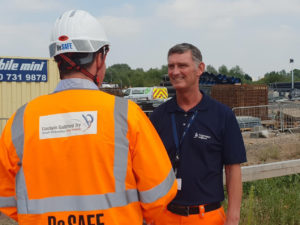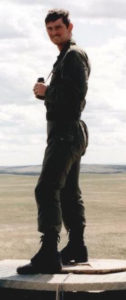Highways England is the government-owned company responsible for modernising, maintaining and operating England’s motorways and major A roads. TMT approached them for follow-up information after they sent out a press release about a jobs open-day. Upon being asked if Highways England have any experience recruiting veterans, the Press Officer said ” Well that’s a coincidence as we are just about to release a piece about an Army Veteran who joined us and is doing really well!” And here it is…….Ed
Words and photos courtesy of Highways England
A former military engineer who spent much of his working life travelling the world fixing telecommunications in the field is now enjoying another career improving journeys for people driving up and down the M1.

Nick Robinson, a former Artificer Telecommunications with the Royal Electrical and Mechanical Engineers (REME), even had a spell with the US Army as part of his three decades in the armed forces. Back in ‘civvy street’ he has landed a role project managing a scheme to turn part of the M1 in the Midlands into a smart motorway. He is now urging anyone leaving the armed forces to follow his lead and consider a career with Highways England, the Government company responsible for the country’s motorways and major A roads.
Nick said: “The armed forces is a great place to work and it can seem a daunting task when thinking about leaving. “But I can honestly say I am finding life at Highways England similar to working in the Army - I’m proud of what I do, making a difference and helping others. Two working days here are never the same, as was the case in the Army and as highly skilled ex-service personnel we can make an immediate contribution to the company’s work improving the country’s motorways and major roads.
“I would urge anyone looking for a career change or a new challenge to give this company a go.”
Nick recently spoke of his transition from the military to motorways at the Raja REME careers and employment event at the REME museum in Chippenham, where he provided inspiration for those looking for a career change or a new challenge following retirement from service.
Since proudly signing an Armed Forces Covenant in June 2017, Highways England has actively been supporting all leavers from the military through their reintegration into civilian careers, helping operate, maintain and improve the spine of the country. New recruits to Highways England from the Armed Forces are all assigned a buddy who is also ex-military to support the new starter into the company and help smoothly integrate into the civilian work place.
Leading mental health charity, Combat Stress, who works with veterans helping them tackle the past and plan for the future, welcomed this recruitment campaign. Speaking about the initiative, Chief Executive of Combat Stress, Sue Freeth said: “Former servicemen and women bring enormous value to the workplace. Most service personnel make a successful transition to civilian life but a significant minority can struggle after leaving the military. At Combat Stress, veterans tell us that with the support of their employer, they’re able to engage in mental health treatment alongside full time work and have a rewarding career applying the skills and knowledge they developed in the military.
“I’m delighted to see this campaign from Highways England to recruit more veterans into the company. The buddy initiative to help veterans transition to a civilian job is a fantastic example of how a company has created an effective support programme in the workplace.”

Most of Highways England’s roles are suitable for the ex-forces with many of the skills being transferable. Popular roles include operations and project management, through to support functions such as commercial and procurement and IT roles. You can search and apply for jobs at Highways England via the careers webpage: https://careers.highwaysengland.co.uk/search-apply.
Read how Nick made his transition into Highways England in November 2015:
Q. Did you always want to join the military? Is there a family history?
Funnily enough, there isn’t. I left school in the 70’s and went on to be an apprentice heavy engineer. Let’s put it this way, I didn’t have a good relationship with my boss, so one day I left for the day and went into town and applied to join The Army. I did and completed 31 and a half years in service.
Q. Why did you choose Highways England?
I left the Army and spent some time transitioning and moving home with my wife to the North West. I soon realised that my CV was too specialised and needed to move to a place where there was more opportunity.
I ended up returning to the Midlands, where I am originally from, working for a company called Force Protection Europe, a military vehicle that can withstand explosions and provides specialised protection against roadside bombs and improvised explosive devices (IEDs).
Following this, I travelled around the world and became a qualified diver. On my return home, I attended the engineering construction fair at the NEC. Contacts there helped me to construct my CV and advised me to consider companies like Network Rail or The National Grid. After searching specialist websites I came across the project manager role at Highways England, and I’m really pleased I did.
Q. How did you find the transition from military to motorways?
I just took it in my stride. Everyone has a different way of coping with returning to civilian life, and I have my way that works for me.
Q. Is there one particular skill you’ve brought from the military that you find particularly useful in your new position?
Rolling with the punches. Two working days at Highways England are never the same, as was the case in the Army.
Q. What does it mean to be a Project Manager for Highways England? What is your role from day to day?
Similar to working in the Army - I’m proud of what I do, making a difference and helping others. I am the assistant project manager for a scheme to convert the M1 between junctions 23a to 25 into a smart motorway, smart , so I am helping to improve people’s journeys; no two days are the same and I cover all aspects of project management including leading from the front.
Q. What do you most enjoy about your job here?
I go out at least twice a week on to my scheme, and it’s great to actually see the difference and changes as it develops.
Q. This year is The Year of Engineering, what would be your one message to inspire the young?
Go for it! If you’re thinking of doing it – don’t think about it, just go for it!
Q. One piece of advice for any member of the Army who might be looking to change careers but are worried about leaving the armed forces?
Research, research, research. Research where you are going, research the qualifications you have and how you can convert them into something a company is looking for, and then research how you will approach the company – do you have a connection that can make an introduction? How will you write your covering letter?
If you are a Service Veteran who found a job under the Armed Forces Covenant scheme then please let us know and we will publish your story. If you are an employer who supports the scheme and you would like people to know about you - again please let us have details with some names of Veterans working for you and and we will publish your story on The Military Times website.

Comments on From military to motorways - what would you do in a second life?